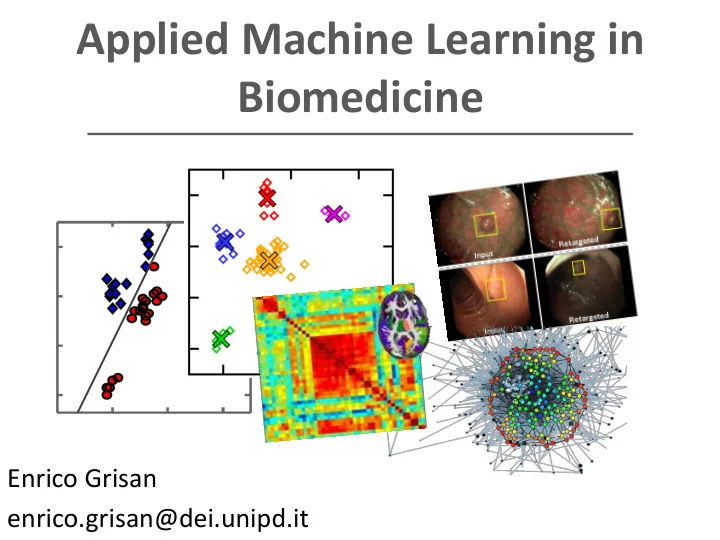

Applied Machine Learning in Biomedicine Enrico Grisan enrico.grisan@dei.unipd.it
From biology to models
(Artificial) Neural Networks
Backpropagation • Loop: – Sample a batch of data – Backpropagate the loss function to calculate the analytical gradient – Perform parameter updata
ANN Practicalities 1) Preprocess the data! % X = NxD test cases mx = mean(X); mx = mean(X); sx=std(X); sx=std(X); for ct=1:size(x,1), X=X-ones(size(X,1),1)*mx; X(ct,:)=X(ct,:)-mx; X=X./ones(size(X,1),1)*sx; X(ct,:)=X(ct,:)./sx; end
ANN Practicalities 1) Preprocess the data! % X = NxD test cases Sx = cov(X); [E,D]=eig(Sx); R=E’; W=sqrt(inv(D)); Xw=(W*(R*X’))’;
ANN practicalities
ANN practicalities • Run cross validation across many tips & tricks • Use visualization (training/validation, loss curve, weight update, weights plot …) to guide the hyperparameters ranges and cross- validate • Ensamble multiple models
ANN in Matlab % X = NxD test cases % Y = Nx1 target values % Initialize the network net = feedforwardnet(10); net = train(net,X,Y); Yhat = net(X); perfs = mse(net,Y,Yhat); % Adding L2 regularization net.performParam.regularization = 0.5; net_reg = train(net,X,Y);
Pancreatic tissue Clinical Gast. Hepat., 2012
Removing bones from RX Chen et al. IEEE TMI 2014
Autoencoder Encoder Decoder 𝑡 𝑡
Convolutional Neural Networks
Hyerarchical organization
Shared weights
Local connectivity Image RGB: 32x32x3 before : each neuron will connect to 32x32x3weight Full connectiviy now: one neuron will connect to, e.g, a 5x5x3 patch, and have 5x5x3 weights Local connectivity
Depth
Receptive fields Replicate the column of hidden neurons across space, With some stride 7x7 input 3x3 connectivity (receptor field) 1 stride
Receptive fields Replicate the column of hidden neurons across space, With some stride 7x7 input 3x3 connectivity (receptor field) 1 stride
Receptive fields Replicate the column of hidden neurons across space, With some stride 7x7 input 3x3 connectivity (receptor field) 1 stride
Receptive fields Replicate the column of hidden neurons across space, With some stride 7x7 input 3x3 connectivity (receptor field) 1 stride
Receptive fields Replicate the column of hidden neurons across space, With some stride 7x7 input 3x3 connectivity (receptor field) 1 stride 5x5 output
Receptive fields Replicate the column of hidden neurons across space, With some stride 7x7 input 3x3 connectivity (receptor field) 2 stride
Receptive fields Replicate the column of hidden neurons across space, With some stride 7x7 input 3x3 connectivity (receptor field) 2 stride
Receptive fields Replicate the column of hidden neurons across space, With some stride 7x7 input 3x3 connectivity (receptor field) 2 stride 3x3 output
Receptive fields N Output size: F (N-F)/stride+1 N N=7, F=3 stride 1 (7-3)/3+1=5 stride 2 (7-3)/2+1=3 stride 3 (7-3)/3+1= ??
From columns to volume All stacked neurons form [1x1xdepth] columns, that combine in the output volume
Volume dimension Input image: 32x32x3 Receptive field: 5x5, stride 1 Number of neurons: 5 Output size: (32-5)/1+1=28 Number of neurons: 28x28x5 Number of weights per neuron: 5x5x3 Number of weights: 28x28x5x5x5x3=294000
Padding zero-pad the image 7x7 input 3x3 connectivity (receptor field) 1 stride 7x7 output
Volume dimension Input image: 32x32x3 Zero padding Receptive field: 5x5, stride 1 Number of neurons: 30 Output size: 32 Number of neurons: 32x32x30 Number of weights per neuron: 5x5x3 Number of weights: 32x32x5x5x5x3=2304000
Weight sharing If all neurons at the same depth in the output columns share the same weight, we can have «slices»: One activation map (a depth slice) computed with only a set of weights
Convolution and filters When all weights at the same depth are equal, the activation map can be computed through a convolution: 𝑔 𝑦, 𝑧 ∗ 𝑦, 𝑧 = 𝑔 𝑜 1 , 𝑜 2 (𝑦 − 𝑜 1 , 𝑧 − 𝑜 2 ) 𝑜 1 𝑜 2 The weights represent a filter ! The slices (filtered images) represent feature maps !
C-NN
CNN architecture
CNN architecture
Weight interpetation
Max pooling In convolutional NN architectures, conv. Layers are often followed by pool (downsampling) layers
ICPR 2012 Mitosis detection Wang et al. JMI 2014
MICCAI 2013 Mitosis Detection Ciresan et al. MICCAI 2013
Lymph node detection Roth et al. MICCAI 2014
Recommend
More recommend